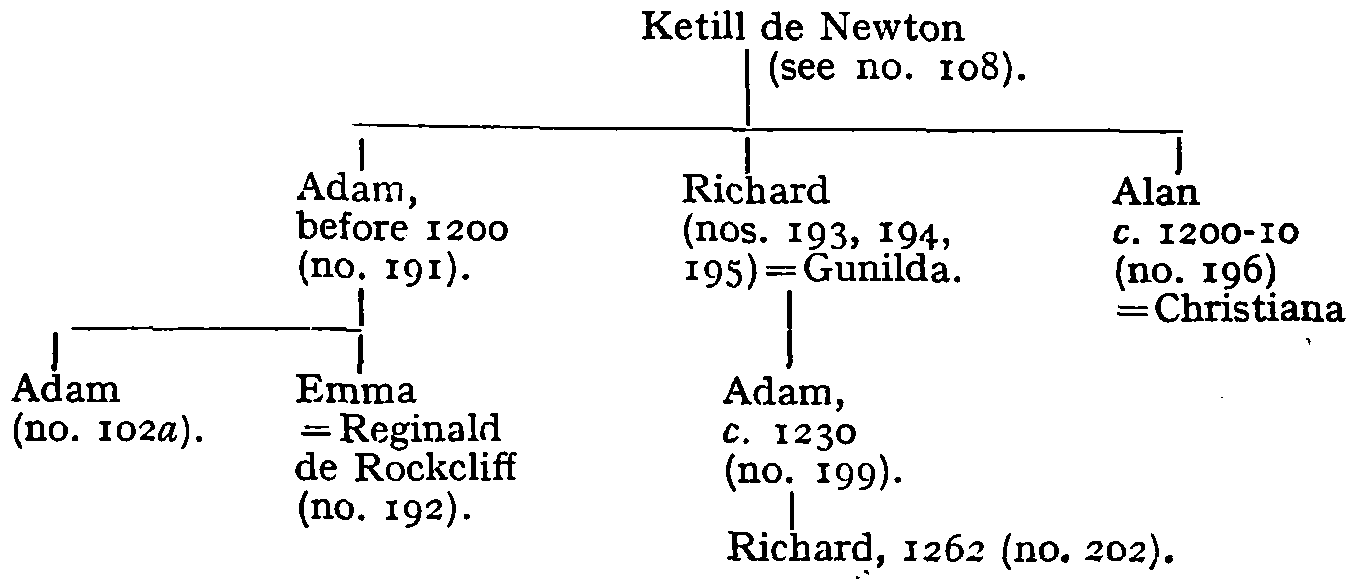Register and Records of Holm Cultram. Originally published by T Wilson & Son, Kendal, 1929.
This free content was digitised by double rekeying. All rights reserved.
'The Register: West Newton', in Register and Records of Holm Cultram, ed. Francis Grainger, W G Collingwood (Kendal, 1929), British History Online https://www.british-history.ac.uk/n-westmorland-records/vol7/pp68-69 [accessed 9 May 2025].
'The Register: West Newton', in Register and Records of Holm Cultram. Edited by Francis Grainger, W G Collingwood (Kendal, 1929), British History Online, accessed May 9, 2025, https://www.british-history.ac.uk/n-westmorland-records/vol7/pp68-69.
"The Register: West Newton". Register and Records of Holm Cultram. Ed. Francis Grainger, W G Collingwood (Kendal, 1929), British History Online. Web. 9 May 2025. https://www.british-history.ac.uk/n-westmorland-records/vol7/pp68-69.
West Newton.
191. (C. pp. 202, 147; D. art. 78).—Adam f. Ketill de Neuton grants to Holmcoltran common pasture for all the beasts of the grange of Mayburg [Mawbray] through his land of Neuton, except in woods and meadows, as his father granted before his death. Adam has for some time refused to ratify this, but now confirms it. He grants moreover that the monks' watercourse from Polneuton towards Mayburg may be made over his land, and desires that no impediment be placed in the way of all the concessions he has made to them. Witnesses [from H. 2]— Gilbert f. Serlo, etc. [See nos. 89, 204a; date before 1195.]

[De Newton pedigree]
192. (C. p. 147).—Raynald de Routheclive and Emma his wife, daughter of Adam f. Ketel de Neuton, confirms [no. 191. A Reginald de Rockcliff is named (C. & W. Trans. N.S. xxiv, 57) in 1185–88].
193. (C. p. 147).—Richard f. Ketell de Neuton, with consent of Gunilda his wife and his heirs, grants to Holm abbey [as no. 191], as his father Ketell and his brother Adam have granted [c. 1200 or earlier].
194. (C. p. 148; D. art. 78).—Robert f. Waldeve Barne de Neuton grants to Holm abbey common pasture in Neuton, with all grants of his lord Richard f. Ketil. [Barne, O.N. and dialect barn, child, probably means 'junior,' as in the case of Bueth-barn at Bewcastle. c. 1200.]
195. (C. p. 148; D. art. 78).—Richard f. Ketell de Neuton grants to Holm abbey three acres in Neuton, i.e. two between the toft formerly of Gamell the smith (faber) and the croft formerly of Thomas de Brunefeld, and one acre nearer the croft of Thomas de Brunefeld on the east, and common pasture of the vill for 12 beasts (animalia), 30 sheep and two horses, with their young up to two years old; to be held free of secular services as freely as any in the diocese of Carlisle [c. 1200].
196. (C. p. 148; D. art. 78).—Alan f. Ketill, by desire of his wife Christiana, grants to Holm abbey liberty to take millstones for their own use within the bounds of his land of Hensingham; also pasture on the common of the vill for their oxen during eight days while they are digging and carting the stones. [Alan held Hensingham and Bolton in Gosforth, and appears in St. Bees, pp. 115n, 250, c. 1200–10.]
197. (C. p. 149; D. art. 78).—Richard f. Ketell grants to God and St. Mary and the monks five acres in Neuton, i.e. two between the croft formerly of Gamell [etc. as in no. 195]; and he confirms the grant of Thomas de Brunefeld of 1½ acre in Neuton [c. 1200].
198. (C. p. 149; D. art. 78).—Robert f. Waldeve Barne de Neuton confirms to Holm abbey the grant of Adam f. Odard in Neuton, i.e. two bovates and three acres, and one toft and croft in the same vill. [Adam f. Odard, not yet baron of Wigton, is in this and the next charters under-tenant of Robert. Date c. 1200.]
198a . (H. 1; D. art. 78).—Adam f. Odard de Neuton grants to Holm abbey two bovates in Neuton and 3 acres in his croft to the east in Neuton, free of all services [c. 1200].
199. (C. p. 149; D. art. 78).—Adam de Neuton f. Richard confirms to Holm abbey the grant of Adam f. Odard in Neuton, i.e. two bovates and 3 acres; and one toft and croft in the same vill. [The grantor appears in St. Bees, nos. 109, 110, of the first half of the 13th century.]